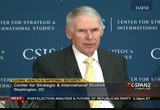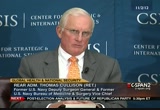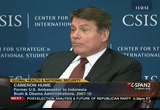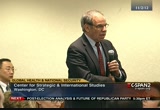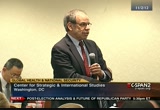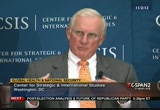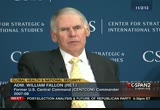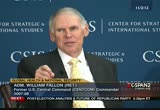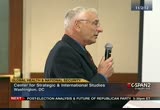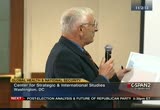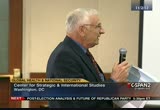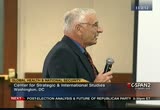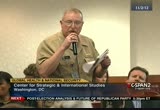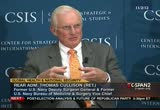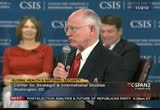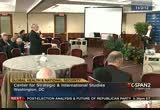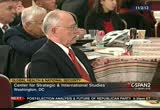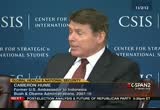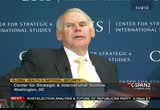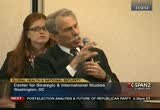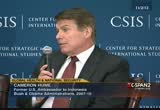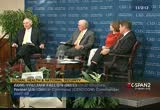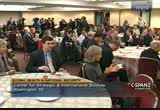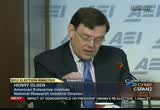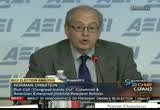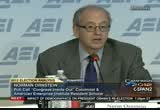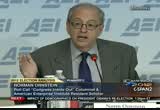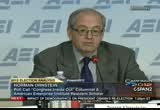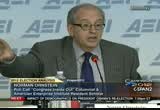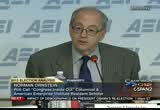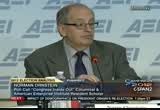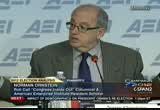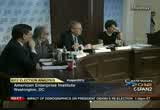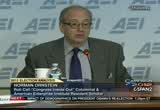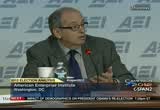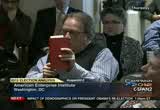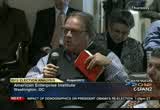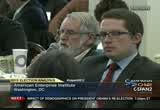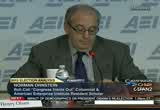tv U.S. Senate CSPAN November 9, 2012 5:00pm-7:00pm EST
5:00 pm
>> i couldn't agree more, doctor and that is in fact the proposition of this whole engagement of the military and global health is, that the ounce of prevention might save you a ton of cure later on and how do we get ourselves in the mode of thinking about that? >> i couldn't agree more in the second you make about disaster risk reduction really is the focal point behind designing many health engagement opportunities in the military. we are more likely to respond to an area, how can we and others look at the capabilities that are there locally and how can we very specifically improve on those? i gave one example of a medical evacuation and trauma setting in a country but how can we look at the availability of water and how can we look at the health system in general, how can we look at training in emergency
5:01 pm
5:02 pm
administering hiv treatment in a country where the civilian authorities said they would never allow it. your point is well taken and sometimes there are opportunities to do that. >> of i can also. one of the most important ways to prevent is to do credible and reliable health surveillance. in many countries for which we have no strong visibility on the presence of infectious disease and with such a mobile world, undetected infectious diseases are a threat to us all. >> thank you. >> if you can see the hands better than i can, people with their hands up, position yourself and we will get the
5:03 pm
next time around. >> thank you for your presentation. as you know, there has been a debate about what health can contribute to security. there is agreement that health intervention and human security, and also the united states has a major role in humanitarian spots and that is not necessarily driven by national security considerations accepting a very broad sense. but there is a debate about the extent to which prevention can concrete we improve national security. there is a lot of agreement global infectious control and border patrol can help our security but i am interested in what you think are some concrete ways in which u.s. national security can be improved through
5:04 pm
help intervention beyond cross border infectious disease control. >> anybody care to take that one? >> i will be glad to respond. there has been a lot of debate. you and i have had a lot of debate in this area. we thank csi as for bringing us together. we never would have met otherwise. there's a wide diversity of opinion on this topic. it seems to me the global health security in terms of a rapidly expanding disease is something everyone would agree is something we should prevent. admiral fargo whose video early on was once asked why do all the cooperation stuff in the pacific? there are no wars going on. he said your point?
5:05 pm
he felt strongly by engaging other countries, talking about military, engage in other countries in peaceful areas we could have discussions would lead to a more stable likelihood of a more stable environment and i would put that forward as a way of engaging other countries and hopefully by closing the gap which i believe has happened over the last several years between the military industry to historically working for the military for the common good for the country in which we are operating and this will lead to more stability in a larger sense as a part of society along with the rule of law and stable economy and thriving business, eight parts society. >> i have an answer that is quite controversial that doesn't have to do with the military perce but has to do with the policy on how much u.s.
5:06 pm
controlled the development of medical devices and drugs and it has become so problematic that big pharma and medical technology developers are now going to other countries to do clinical trials and the work that is necessary to prove there are drugs and devices that work successfully in humans. this is a very backward way of promoting national security in the context of preventing people from disease and injury through advanced technology but it is important that our industry in the health sector is turning to other countries, that we maintain strong relations with those countries and make sure there is a handshake between our medical professionals and their medical professionals, the we are not just experimenting on their population. that is important unintended
5:07 pm
consequence of the current policy. >> if i could pile on the your question, i see a connection between bill held, poor health, economic activity, lack of, leading to and related to lack of education, and local in security that invites inattention, lack of governance, and as we have seen in recent decades, places where insecurity and instability are havens for troublemakers and these troublemakers' become by the by more direct security issue for
5:08 pm
this country. and i think when you get a situation where people have been spending most of their energy and time focused on their ill health or the ramifications of that with family members, there is not much space for doing the things we would like to see. so we have great ideas, wonderful examples of governance, education and so forth that we have seen and would like to spread, people don't have time for it. can focus on it. the vacancy, the vacuum created by that basic security invites trouble and in my experience this is where problems are. as i look around the world, there are a few areas that are well-educated and well defined and troubled, but vast areas
5:09 pm
that are troublesome that are all marked by lack of stability and so forth. these tieback pretty directly. it is a big world, a lot of different situations. >> the gentleman in the front and then we will get the uniform in the back. right here. >> i am ed vermont from the national institute of disease, and before that, i am a retired officer and i was actually recruited to and i age because of my military background. in 12 years ago, but director of the institution recognized hiv aids had to be addressed outside of our country and no one else,
5:10 pm
not the cdc or usaid are better off than they were, not nih, has the capacity to do the operational aspects that are necessary internationally except the military. it has worked out extremely well. a few years ago, the thought was we would never have an hiv vaccine, but the military pull off a vaccine trial in thailand known as rv 144 which changed the complexion and we will one day have a vaccine. no one else could have done that. my job was to oversee that developments for nih and no one else could do it. not a contractor or the cdc or usaid, no one, just the military. two overseas labs i know best are egypt and thailand.
5:11 pm
they have been around a long time. they were set up after world war ii in the early 1915s. why have they done so well? why are they looked upon as an asset by the country? it is because in those two situations, locals feel that they own part of the organization. if you go there to visit, you see a lot of the egyptians, they feel it is part of their infrastructure, belongs to them. that has been a tremendous excess in -- hiv vaccine could never have been done. miss embrey hit the nail on the head. the position is to make these work a little better between nih and the military because nih has come to recognize the military
5:12 pm
offers the ability to accomplish its mission. which is basically mixing and pouring in laboratories and knocked out where the rubber hits the road. patients accept certain areas like cancer research. you can't do research on malaria here. it might be changing. if you think about us as a nation, what is best for us in the future, we have built on that, and sentiment, the military labs hallways working to justify their existence. i know that because i did it when i was on active duty. it happens all the time.
5:13 pm
i can tell you ambassador hume and i spent a lot of time together. that program has been a tremendous success but it was built on the navy program. if that didn't exist, we never would have undertaken what was called -- 12 years later in a few years we will be -- nih will be out of it and we will treat them as collaborators of partners rather than running the show. >> thanks for that endorsement. in the front, if we have time, jim could give us quite a bit of background but we will have to hold you off. i will get you in a minute. the gentleman in the back with the hand up in the uniform and after that the lady against the wall. >> thank you very much for an excellent panel here. i am captain bill adams. i hesitate to say this but i'm
5:14 pm
the guy with the global health portfolio at the office of the undersecretary of defense for policy and i don't have a question so much as maybe a comment that will help allay some fears with the panelists and the audience. it may appear that there is a lack of clarity about dod's policy with response to global health. if you feel that, you are right. but we are working to fill that gap. we have a group, i see the back of the head of one of my colleagues who was always waving at me, dr.. anderson. we also have the joint staff surgeon's office and with and a director of humanitarian assistance disaster relief and global health, a great help to us in our -- working on a lot of these issues. what are we trying to do? we are trying to give all of you
5:15 pm
basic definitions on things like global health, humanitarian assistance, disaster relief. it may surprise you or may not the we have problems with our definitions. we have problems with authority's roles and responsibilities. one of the things the undersecretary of defense for policy really likes is for the secretary to always know that all of us are doing things within the law. that matters when we're spending money, though legal authorities and appropriations are carefully scrutinized. we are working to provide dod with a written policy guidance on what we will call global health engagement to be followed at some point by department of defence construction. so help is on the way. another one of the things we are trying to do is navigate the minefield of the interagency,
5:16 pm
dealing with international partners is difficult. dealing with our interagency partners sometimes can be even more difficult for a variety of reasons and many of them have to do with legal authorities. we are trying to do that as well. one last thing is there actually is a pot of money that is designated for for engagements but it is small. it is overseas humanitarian disaster and civic assistance. about $110 million a year, we split this up, various combat commanders have projects they will use this money for for humanitarian assistance. we are really happy when they come up with projects that work on disaster prevention. once again there is a little more order than might be apparent when you are looking for. many of you have probably
5:17 pm
googleed dot policy on global health and done nothing though i must say csis and the kaiser foundation feel they know what dod's policy is, but dot, we're going to tell you what we really think it is and take care of all of us. anyway, wonderful panel, a very provocative. >> sounds like you have a little work to do. the lady back here. where did she go? >> my name is lesley griffin and i with the alliance for health care competitiveness. you mentioned big pharma a couple times. i wanted to ask more broadly if the panelists could say a word or two about the role the private sector place in working with the u.s. military in efforts to export our body of health-care knowledge to other countries.
5:18 pm
>> it was addressed to me. operationally i am a big policy wonk. i very rarely had an opportunity to engage at the ground level, only get reports from the ground. i know that there are a lot of non-governmental organizations which would include industry partners that offered generously their resources to support the needs of the affected population, whether it is drugs or supplies or whatever. there are innumerable organizations out there that specifically their mission is to receive, process, and delivered donations, both financial, personnel and material to those who are making decisions on the response. specifically, i get below the state level and -- >> down in the dirt.
5:19 pm
most of our experience has been during routine engagement missions that more specifically during large responses. private medicine or private health care in my experience was mostly represented by professional organizations specifically that trauma association which brought several nationally known trauma experts many of whom were in the military before private practice. academia in terms of the university medical schools which worked with us but in terms of private for profits or not-for-profit health organizations such as kaiser for these types of organizations we had discussions about a lot of things to do with health care but not so much in my experience with you can help with, not so much in terms of going forward overseas together. that is a group that in these discussions we were talking
5:20 pm
about, probably would be the next group to draw into that discussion if we could expand that group. do you have any other comments? [inaudible] >> and one of the pieces of project hope is to partner with pharma, get supplies, what we would do is in a cooperative way, up leverage our logistics resources which could then be augmented by military resources to manage, when i was in the military i had the chance to be the senior medical guy on the ground for hurricane andrew relief. it is not just a problem outside the country but inside the country where people would bring down and with great intentions or tax deductions in mind or whatever you want to say,
5:21 pm
provide a lot of tremendous resources, expensive drugs and so forth. i brought up logistics' to organize it and eventually turn it over to the state because that was the authority that should be doing it but did not have the capacity in the short term to do it. there are opportunities to get things that as ellen said, and work cooperatively, the issue, a chance to ask the question would be this notion of lots of different well-meaning and well intentioned and capable organizations coming together. often is it is around the disaster but we need to think about how to do it in a more routine time. there are two different pieces and sometimes we mix them up. at the country level, it is
5:22 pm
really in those kinds of times providing the portal to orchestrate all of these so that you have the best capabilities doing the things that they do best. i am curious if you have some ideas about that. we put dark teams in place and things like that where we try to bring folks together but curious if you have a sense of how that could be done better. >> first of all, a lot of it is done very well, very capable people doing very difficult things and others from the u.s. government do the same thing. i think there is no substitute for the element of an embassy theme being active outside the
5:23 pm
embassy. unfortunately over the last generation, we are more active inside the embassy. we talked to each other and want information. generation ago you had to meet people and ask for information and when you do that -- when a crisis comes up no matter how capable your people, dropped in some places like mars. what good is this? the best thing for the country teams to do is to go out on a regular basis and establish those human relationships if i could but also say and look at how we behave in the most difficult places. we send people for shorter periods of time, one year it fors and societies under stress, you never know what you are doing. if we want to prepare to deal with societies under stress we
5:24 pm
have to be a little more honest with ourselves about the civilians who deployed. we have to be a little honest with ourselves and say if you are going there you should go for logger periods of time and build those situations because when it gets worse we are really going to need that. there is something we could do that we have shied away from because in general a civilian agency does not like to think the -- to go somewhere and get a different job and they do have that authority. >> i agree. i think this is one of the nexuses of global health and national security intersect and there's no finer planning organization than the u.s. military to understand and think through all the secondary and tertiary and primary elements of a plan and how to execute it.
5:25 pm
leveraging that skill set through and engaging with the appropriate authority on how to respond to a health emergency and how you would address these issues will before the incident occurred is probably the best solution. those teams probably exist to do that but whether or not it depends on the maturity of that country and its ability to leverage very scarce resources. just like in the u.s. our health care professionals barely have enough time to address day-to-day health care needs as a population, long planning for emergencies. this is the challenge. i think this is where the military and the u.s. in collaboration with other federal partners can be extraordinarily successful. >> in the back, just about running out of time, right
5:26 pm
behind you a quick question. >> i would like to refer back to the university of wisconsin, ambassador hume's reference to the shipments bringing up the issue of what happened in nigeria in 2005 roughly, 2004, the vaccination against polio where all worldwide campaign to eradicate polio was stopped because of agitation against it and allegations that it was an attempt to sterilize children and introduce things like that. i am wondering, was that an anomalous situation? are we likely to see events like that in the future against western intrusions? what would be the best approach to fight situations like that if they arise, and would your response be able to address our those efforts on our part to address that likely to be made
5:27 pm
more difficult because of the alleged involvement of a doctor or health research project involved in the plot that led to the assassination of osama bin laden? >> i think human history is replete with cases -- i think human history is replete with cases of mass folly. are you going to continue to get occasionally sporadic complaints that western or international involvement in health issue is a plot? the answer is yes. i don't find it -- i may find it crazy but not surprising. what you have to do is look to your own bough use and be sure you are doing the best you can
5:28 pm
and you have no doubt. hy don't think you can make everyone happy overtime. >> it gets to the point, i am afraid we have run out of time here. many of you have your hands up for a while, but i think it makes a point that this is the business of health, security, military. we tend to think of them as stovepipes. they are not. relationships are constantly running. particularly interconnected and rapidly changing world, ideas, thoughts, good and bad as well as wonderful prevention's and intervention that could help people are running all the time all over the world. the key for us, a couple takeaways if i could wrap this
5:29 pm
5:30 pm
[applause] [inaudible conversations] >> i need some help over here. >> did he try to get out without anybody knowing? >> he just ruled himself out. >> he was issued --. >> that is ridiculous. >> at some point he could stop breathing. >> we will be doing cpr on a patient. >> we are with sergeant robert gates today. we ended up following him after the plane ride for many months, as i said and he ended up injuring himself in an innovative program at walter reed where they ended up using acupuncture and using meditation
5:31 pm
and other techniques to clean them off about the drugs that he was on and do this program and he was able to walk out of walter reed on his own two feet. so you know i really commend the military for one for allowing us to tell the story, both the good, both the good and the bad, but for recognizing there is a problem, by recognizing that there is this problem of overmedication and that they are looking for outside of the box ideas on how to fix it. that is sort of the whole thesis of the film really, the metaphor of escape fire, the status quo isn't working and we need to start looking for outside of the box ideas. >> c-span programming is good because they try to cover both
5:32 pm
sides of the issue and the moderators especially on the "washington journal" do a good job of staying detached and not getting into offering their own opinions. >> very conference about covering both the house and the senate and other, the woodrow wilson center and other public affairs centers in d.c. that i wouldn't normally be exposed to. >> the american enterprise institute hosted a postelection discussion with a panelist and local presence on thursday. participants included henry olsen at aei, "fox news" channel political contributor michael barone and roll calls congress inside out columnist, norman ornstein. this is an hour and 50 minutes.
5:33 pm
>> my name is karlyn bowman and i'm a senior fellow at aei and on behalf of my aei colleaguecolleagues, michael barone, norman ornstein and had real sin in our c-span viewers i would like to invite you to the spinal session of this election watch 2012 session. i'd like to briefly introduce one of our colleagues who helped to start the aei election watch series in 1982. he is with us here today. then wattenberg and the late richard scanlan where the first people to look at the interactions of democracy -- demography and public opinion data in their 1970 book, the real majority. they told us how important changing demographics would be to future elections and in this election their pathbreaking insights have been confirmed. latinos were a larger share of the electorate than four years ago and they voted as the issue of the monthly political report shows solidly for president
5:34 pm
obama. they did as well with hispanics as reagan the outcome of this election would have been different. between the 2,002,010 census, asians were the fastest-growing ethnic group in the country and in this election they also voted heavily for the president. african-americans are a very slow growing demographic group at their turnout did not decline this year and they gave more than 90% of their vote to the president. so while democracy is not destiny, it is certainly important. demographer joel kline ken says democracy -- demography is the best friend they have. scanlan then wattenberg talked about the key to vote in 1972. in the selection women were 53% of the electorate and they voted solidly for obama. men voted for romney. white, black and hispanic women were more democratic than white, black and hispanic men. the gender gap lives in 18
5:35 pm
percentage points. women ohio voted for obama and women, men in ohio voted for romney. the marriage gap was a whopping 41 points with married voters decidedly republican in this election and the rowing group of nonmarried's overwhelmingly democratic. all of these data are in our new aei political report prepared by andrew and we want to thank claude for getting this report on the fault of the latest 2012 data for 22 key demographic groups available for you today. the demographic changes are being felt in congress too. david wasserman at "the cook political report" wrote that for the first time ever white men will no longer be a majority in the democratic caucus. in 1953, he says there were 98% of house democrats and 97% of house republicans. along with the demographic data, the exit polls show obama was able to defuse the economic issues and he won overwhelmingly
5:36 pm
on empathy. we are going to begin today with michael barone who will tell us what happened and why. all of us on this panel has made election predictions over the course of election watching. sometimes we get it right, sometimes we get it wrong. in news "washington examiner" column yesterday michael said flatly, i was wrong but he followed up with the line, i take some pleasure in finding that i have been wrong because it is an opportunity to learn more. i think we all share that sentiment. after michael speaks we will turn to henry olsen to talk about what defeat means for the republican party or the firing squad is assembled and recrimination phase has begun. from the washington times that this morning in an editorial that chris christie should be excommunicated. [laughter] and jenny beth martin had at the tea party paychecks had this to say about romney. he who hagee was weak, moderate and it does not work she said.
5:37 pm
it's time to find someone for next time who embraces our values. henry will tell us what lessons the party should learn from this election and henry by the way called the popular vote on the nose in this election. he and nate silver deserve kudos overall. finally we are going to turn to norm to talk about what this election means to the house in the in the end the senate and the fiscal cliff regression report that norm's book, it's even worse than it looks, and once again here it is for all of you a great christmas gifts, is number 20 on amazon today. it's been on the bestseller list almost since consistently since it appeared. we want to ask your mother not the republicans have a lock on the house going forward in what the new congress is going to tell us about the future event. michael, we will begin with you. >> thank you very much karlyn and thank you for noting my fallibility. since i told all my law school classmates i was going to be defeated for re-election in 1966
5:38 pm
and i shouldn't remain shy about predictions after that one. barack obama won this election by a 50-48% margin. debts may go up to around it 50-48 when the folks in california command and last time it took five weeks to count their votes. they count them in five hours in brazil so i'm not sure why california's less technologically advanced but there we are. all these figures are incomplete as they replied -- it appears obama will get a huge electoral vote advantage and out of this relatively narrow popular vote margin. assuming that he carries florida where he is the current ahead in the miami-dade county. people are are this year counting votes without the assistance of many republican and democratic lawyers. with florida his electoral vote
5:39 pm
victory is 332-206. bush was 51-48 margin in 2004 india 286 votes and obama was slightly less it appears against 332. i think there is a certain structure of demographic advantage for democrats in the electoral college in this era. democratic voters tend to be clustered into large metropolitan areas and in particular neighborhoods and they give them a craft an initial advantage in the electoral college. president obama got 57% or more of the popular vote in 11 states and the district of columbia and they have 163 electoral votes. romney won 13 states by such margins but they only have 104 electoral votes of basically the democrats have a bigger hunting ground and and a larger base in the electoral college and the mere hunting ground to go find those votes and barack obama
5:40 pm
into campaigns has been successful with 365 and apparently 332 this time in 303 if he doesn't carry florida. this election cycle has been compared by many people to 2004, the election and re-election of an adnan, and by mobilizing supporters and getting them out. i think it's actually little more like 1996, which was a different election. one respect is, in one respect it clearly was. turnout was way up in 2004 from 105,002,242 -- turnout was down in 1996. you know, i have a hypothesis that when economic issues are an issue, economic contentment in 96 and economic discontent in 2012, it doesn't bring voters as much to the polls as when not
5:41 pm
economic or cultural issues, war and peace issues are issues which they seem to be in 2004. in one respect, it was unlikely in 1996 in 2004. clinton and bush both won with increased margins. clinton's 49% in 96 would have been 51 or 52 if you split the perot vote according to the second choices and that was an increase from its 43% in 1992. bush pushed his popular vote up from 40% to 51%. obama however declined from 53% to 50% or possibly 51. his victory was a victory for big government policies. obamacare will surely stay in place and obviously the president and the democratic majority in the senate will have a lot to say on fiscal issues which i gather they will discuss. less of a victory i think our big government ideas.
5:42 pm
clinton pivoted the center on issues will the voters while will not and these gave him larger percentages. obama ran essentially a negative campaign against romney, with the firewall strategy spending half of preconvention dollars on energy. the three firewall states are florida, ohio and virginia besides indiana and north carolina who won victories in 2004 the lowest percentage states were for barack obama. the states together have 60 electoral votes and they're obviously more important. with them obama would appear to have 332 electoral votes and without them he would have 272 which mean only one other state would have tipped and it's like -- not a likely candidate if you look down the percentages in this election but it was nonetheless close. and i think this proved to be affected. he is currently carrying florida
5:43 pm
by 46,000 votes in ohio by 107,000 virginia by 100,000. those 253,000 vote margins are responsible for the big electoral vote margin. it's a classic example of a high-risk strategy. the obama strategists are now going to be hailed as some appropriateness for employing the strategy and if a few numbers have turned a little differently they might be excoriated at the fact is they succeeded. when you compare movement in the targets and the nontarget states you look at the eight target states, colorado florida iowa nevada new hampshire and north carolina ohio and virginia obama's percentage only declined 1.5% from 2008. if the rest of the country whether you're talking about solving -- solidly republican or democratic states are the target states like minnesota
5:44 pm
pennsylvania and wisconsin obama's percentage was down 2.8%, double the amount, that he still would carry the rest of the country aside from the target states but not as big of a percentage. one of the fascinating things about this election is with an electorate that believes things are moving in the wrong direction, and congress reelected a democratic resident, retained a, got god and even more republican, democratic senate with some powerful assists assist from some republican candidates. [laughter] and i wonder if they have investigated the possibility of moles. anyway, and they have retained a republican house. an article in "the wall street journal" coming out tomorrow on this issue. republicans according to the current count have a net loss of
5:45 pm
62,000. they started off as compared to 2000 -- 2012 -- 21,021,242 is bigger than the majorities they had when newt gingrich was speaker and that is despite apparently losing and these counts will change as the final results are tabulated. that losing five seats each in hell and i and california through redistricting. republicans nonetheless had minimal losses here. so this is another way that is different from 1996. clinton in 96 won by a wider majority and republicans very held onto a majority in the house. this year obama won by a narrower majority and republicans retained a big, retained a relatively large house majority although not as large as democrats have after 2006 and 2008 elections. so i think john boehner has some basis for saying that if the
5:46 pm
president has a mandate so do house republicans. the popular vote for the house republicans will probably come out to something like the same 50-48 by which obama beat romney. that hasn't been fully tabulated yet. back about 20 years ago, circa 1990, political scientists and pundits said the republicans have a lock on the presidency and the democrats had a lock on the house and they had all sorts of good reasons why this was so. the democrats picked the lock on the presidency in 1992 and republicans broke the lock on the house in 1994. starting with those elections democrats have won four of the six presidential elections and plurality of the popular vote and other republicans have won majorities in six out of eight elections for the house of representatives. so, it is eight out of 10 in the
5:47 pm
house of representatives. looking back from 2014, back 20 years, 21994 we will have had during that period for 10 years a democratic president and a republican house, two things that people in 1996 it never happened. so it's something like the new normal. it was the period before 1990 the normal was republican president democratic house and it seems to be the reverse there. if that happens the demographic reason is democratic votes are clustered in a statement opposing areas and john mccain in 2008 -- arauca bowman 208,128 congressional districts with 80% of the vote or more in and john mccain 10 i that margin. that gives democrats a lot of votes in those big states but it could also mean there are not that many democrats in the adjacent districts. at this time obama carried about
5:48 pm
the same number of states with that percentage. romney may have gotten a percentage in one or two districts and utah. so maybe it's time for a political scientists scientist and as political pundits to rule out another rule about locks and who has the lock and which on which part of the government before that rule too becomes obsolete. thank you. >> i think the temptation for republicans are in many cases going through this are first going to be engaging in denial and that is what you saw with the washington times. it's understandable. it's a human response, but it would be very smart for the republicans to get further along because they cannot stay in the denial stage very long. because when we look at what we have, it is not a full picture
5:49 pm
but it is not a pretty one. karlyn talked about the demographic changes. that is something that is nothing that any republican can do anything about. even if we stop immigration 100% tomorrow, which frankly no one wants to do, the numbers that are already in the case means the share of whites are going to continue to decline over the next 20 years as the american electorate and the share of nonwhites will continue to rise. because of longevity differences between males and females the share of women in the electorate is going to slightly rise over that period because very frankly as people live longer men will die at 80 and 11 -- women will live until monday so we will have a slightly share larger share of women. it's really not a good idea to ignore that. one fact i would like to focus on for my presentation today is
5:50 pm
an exit poll numbers that has not gotten a whole lot of attention but i think will end up trying to resurrect. that is at the end of the exit poll, the voters were asked which of the following four qualities are most important to you in selecting a president. romney won three of those and he won each of those by double digits. he was the reflection of the person people said they most value in a leader. he was the choice of the people who said they most valued somebody with a strong vision for the country. and he was the choice of the people who said that they most valued having someone that share their own values. the reason mitt romney is not presidents' day, and i submit the recent wide conservatism generally has been locked in a 50% feeling nationwide since the end of the cold war even though
5:51 pm
sometimes we can translate that into majorities in the house, is because of the last group. the last group, that question is the thing that they value the most is somebody who cares about people like them, cares about people like me. mitt romney will affect -- now when you lose 20% of the electorate, 63 points, that is a problem and it makes sense that you would do this in light of the campaign that both candidates ran particularly the campaign that the obama campaign ran which was simply a modernization of the campaign that democrat candidates turn to in difficult times ever since the new deal coalition won in 1932. in canada, the conservative party won the most recent elections by tarnishing the leader of the political party
5:52 pm
and in a parliamentary system that is basically akin to campaigning against the presidential candidate. michael ignagni is was a harvard professor who is a canadian native who returned to his country to run for parliament and was a liberal party candidate. what they did was they systematically painted him as somebody who by his experience and ideas was out of touch with the aspiration of the ordinary canadian and their television ads had a tagline that was brutal and sustained. he did not come back for you. the obama campaign wasn't so brutal in its overt message but was as brutal in its covert message. the message that they decided on was essentially to say that the romney republican agenda and they were always very clever in tying demands -- the man to his party is that he and they are not running for you.
5:53 pm
and they did it on the level of values. for women, one was the war on women, what was the contraception issue about? but to say they don't understand you, they don't care about you, they don't value you, they are not running for you. what was being about? tax cuts for the wealthy about? talk to the blue-collar, struggling worker, white, black hispanic or asian who struggles from paycheck to paycheck may go through periods of an insurance feature to say when it comes to the economy, they think the way is to give their friends more money and hope that they do well by you. you don't believe that, you are not running for you. latinos, the immigration issue was about. if you want to be part of the american jim they want you to pass the d.r.e.a.m. act. they are not running for you. does anyone have any questions as to why with those series of
5:54 pm
arguments and that series of consistency that interweaves into a mirage that makes sense, white 21% of americans think that caring about people like them is the most important feature in a national leader, why they would select the person who is making that argument against the person who is said not to be running for them. now republicans have to admit that as much as that is a caricature of romney and as much as that is the character of republicans, characters only work if they make sense in life as the person being caricatured so even joseph goebbels said propaganda itself has to have a colonel of truth at its core so what republicans need to do is take a hard look at ourselves. republicans need to ask if that is how i 5 of americans overwhelmingly perceive us, what do we need to do to change?
5:55 pm
americans of all shades and sexes wants a government that is on their side that supports the values and is not a paternalistic thing they want. a lot of the people who voted for president obama voted for democrats also answer the question, do you want a bigger government or a smaller government? on the smaller government side, what they don't believe is the republican party is someone who understands the use of government is legitimate and can be effective in giving them a hand up in american life. they don't want a hands-off society. they don't want as president obama said do you are on your own society and they don't want to hand out societies, the hands-on society the republicans accused democrats of. they want a hand up and they want a limited but energetic government and the republican party has to recognize that crucial segment of the electorate that consistently does not vote republican.
5:56 pm
i'm going to close with a reading from the speech that i wrote about in the national few in an article called open your heart and it's what richard nixon said at the end of his acceptance speech. it will take a minute or two. he said towards the end of his speech that tonight -- he lives in a city. he is lack or he is white. he is mexican italian polish, none of that matters. what matters is he is an american. that child is more important than any politician. he is american. he is a poet, scientist, teacher. is everything we ever hope to be and everything we dare to dream. he sleeps the sleep of childhood and he dreams the dreams of a
5:57 pm
child. and yet when he awakens, he awakens to a nightmare poverty, neglect and despair, a failing school and he ends up on welfare. for him the american system is one that starves his soul. at it breaks his heart and in the end it may take his life into the battlefield. and to millions of children in this rich land, that is their prospect for the future. this is only part of the america i see. i see another child. he hears the trains go by, trains a faraway places where he would like to go. it seems like an impossible dream. a father he had to go to work sacrificed everything so that his son could go to college. the gentle quaker mother with a passionate concern for peace who quietly wept when he went to war but understood way yet to go. the teacher or remarkable football coach and inspirational manager encouraged him on his
5:58 pm
way. the courageous wife stood by him in victory and in defeat. and in his chosen profession of politics, there were hundreds and then thousands and millions who were for his success and tonight he stands before you nominated as the president of the united states. you can see why it believes a deeply in the american dream. for most of us the american revolution has been one. the american dream has come true and what i ask you to do tonight is to help me make that dream come true for millions of children. it's an impossible dream today. ladies and gentlemen, when a republican leader can read that word and read that speech without a hint of irony, with full measure of sincerity and being able to insert the female pronoun for the mail as is appropriate, then the republican candidate will be awarded with the presidency and the republican party will be awarded with the majority and we will
5:59 pm
see what a republican government can do for america. thank you. [applause] >> the thank you very much henry and onto best-selling author norm ornstein. >> thanks karlyn. i want to suggest to everybody in the room and in the audience if you have not read henry's pre-election memo which is national review on line, do it. even though the election is over because it's not just about having the number spot on. it's about what is behind it. the analysis is the best you will see about why the electorate is going the way it is and where it is going and so i give him a big shout out on that. now i want to say just a mea culpa, as karlyn said about michael, we have all been wrong at times and i was wrong on the choice of a running mate for mitt romney.
6:00 pm
i predicted he would choose newt gingrich. i thought it was the perfect balance ticket, a mormon and a polygamist. [laughter] i was wrong about the marijuana initiatives. i thought they would fail because i thought there were be as essential number of supporters who would wake up on wednesday morning in say hey dude was that election yesterday? i missed that one as well. but i also want to comment about somebody else who is perhaps her most astute prognosticator and analyst and of course that is dick morris. just say that the best line of the year by far is from david axelrod, who said the other day, i've had to put -- mike my mike my foot in the mouth over the years but it has always been my own. [laughter] thank you david burger every time you see dick morris on television, believe me he will
6:01 pm
be on at least as much of not more in the future. think about that. now, on to congress and i'm not going to talk a lot about the elections themselves although it is of course so interesting that for a country which is setup with set up with politicians and politics, angry at where we are and about the dysfunction, that we do end up with the status quo auntie. but there are couple of interesting elements to that. six months or a year ago, maybe three months ago, maybe three weeks ago, none of this would have said with any level of confidence, much less believe, the democrats would pick up two seats in the senate or that they would lose only one of their own. there were 23 democratic seats going into the cycle and be thought half of them were highly vulnerable that there were 10 republican seats and going and we thought no more than one perhaps would be vulnerable.
6:02 pm
that republicans lost several of their own was insignificant part attributes of to what michael said in that is of course the same thing happened in 2010 in this sweeping election where republicans won 63 seats in the house, huge numbers of seats at the state level and legislative level and could easily have captured the majority but didn't. it was because of instances of snatching defeat from the jaws of victory and states from nevada with sharron angle as the nominee to delaware with christine o'donnell and this time you could easily say it at least about two and probably more of those races. now i don't think it's a matter of democrats having inserted mulls into the republican party. it relates to what henry has been talking about. you have up party that is driven and dominated by a wing which is
6:03 pm
not conservative but radical and it's a problem in the presidential nominating process level and a problem in the congressional nominating process level. is a problem in primaries as we go ahead and has great relevance for whether we will be able to find that common ground we have been talking about. and just a word or two about the house. democrats needed a net of 25 seats to capture a narrow majority. it looks like it will probably win 25 or more republican seats but you have to take into account whether you lose any of your own and they have lost a number of their own. now there were a couple of surprise victories on their part. moderates who we did not expect would prevail. john barrow and georgia was redistricted from the second consecutive time to a seat that should have been an absolute loser for him but he prevailed and not just by a handful of votes as a template for how you can run as a democrat in a conservative area and a smart
6:04 pm
guy. jim matheson in utah in a seat where an enormous amount of money went and. i was out in utah and bumped into well at the airport. he had been there doing an event, an african-american, young conservative mormon republican. now that is a mouthful, and an immigrant. and attractive candidate but matheson who knew how to run in the district prevail. there is still opportunities for moderate democrats but the numbers are down. they are down from what they were in 2010. going and they are down now as well and on the republican side, that is the other factor here, was that in many states the redistricting did provide republicans a firewall or losses occur. in arthur -- carolina democrats captured a majority of votes state-wide and ended up
6:05 pm
with three out of 12 seats. that tells you something about the power of redistricting. it work him both sides but republicans build a firewall that worked very well for many of their potentially vulnerable freshman and other members and also built-in some advantages that caused democratic losses. so, that is where we are. the relevance of the democratic gains in the senate are significant because with 55 what should be and will be another enormous republican advantage in 2014, 20 democratic seats for only 13 republicans and here again the republican seats on the surface look very safe. they are states where it's unlikely you would see losses but you could see once again a few of those occasions where victory is denied because of nomination struggles and democrats have several seats that could be more vulnerable.
6:06 pm
but if you are within one, two or three you can pretty much count on the minority and it changes how you behave in the next two years. if you need five or six and now it will be six, that becomes a very different matter and it makes it harder and it may mean that the willingness of some in the senate to work toward compromise is now rather than wait, believing you are going to be in a much stronger position in 2010, or 15 will be greater but there's another factor to keep in mind for 2014. among those who are up to 2014, mitch mcconnell, john cornyn, lindsey graham, saxby chambliss. if you are mitch mcconnell and we have been sitting here four years ago we would have had unanimity that mitch was king of the republican party in kentucky and there was not even a -- for
6:07 pm
the utterly acknowledged leader and then we get to the 2010 elections and he put every resource he could and every attempt, it every string he could pull to keep rand paul from winning the republican nomination and failed miserably. if you are looking at this from mcconnell's perspective knowing that several of the republicans who ran for the senate this time would not promise going in that they would support mitch mcconnell, and you know that you have the potential for a primary challenge and a party you no longer control, your willingness to compromise on some of these critical issues may be itself compromise. if you are john cornyn you would have stayed out of the race in the republican nomination for the senate this time around but you sat back and watched as the very conservative and powerful figure in the state was beaten from one end of the state to the
6:08 pm
other in the primary by ted cruz because he was a moderate and you have got to be thinking, that could happen to me. and if you are lindsey graham you go in knowing you are the number one, number two and number three and have already said they will spend whatever it takes to beat you and you don't majority of local republican committees and south carolina have basically declared your socialist. so one of the absolute model problem solvers had to think a little bit about whether he will fall on grenades right now and and fewer saxby chambliss one of the greatest members of the gang of six and now now gang of eight who has put himself on the line for a budget deal, george is not exactly a place place where you can expect a primary either. keep in mind the number one in two leaders will be mitch mcconnell and john cornyn. with all of that, we had some interesting messages for the two
6:09 pm
republican leaders on election eve. on election eve john boehner said as michael noted, hey we have as much of the a mandate as he does but that's softened the next day i saying we want to work with the president and we know we need a budget deal and we know we need revenues from that budget deal. mitch mcconnell on the other hand despite suffering a significant loss in his party and the senate was pugnacious and said there is no mandate for the failed policies for the president and cooperation, he better come to us and understand that if it doesn't pass through the house, it's a dead letter. you might take from that you have real opportunities in the house but the opposite is true. the fact is whether mitch believes it or not or was saying it for effect right now, the senate has a group of problem solvers who had been waiting to bust out after this election and
6:10 pm
we have already sena behind the scenes in the two months leading up to november 6 with the gang of eight and now what is really a gang of 40, 40 senators, 20 from each party who have been working with simpson and bowles and now for the first time what has been an absent business community, absent without leave throughout the debate for example now very much engaged to try to come up with a resolution both on the fiscal cliff but what takes us further towards the sizable additional down payment on the larger debt problem and it will almost certainly fit the template of simpson-bowles, rivlin-domenici and the gang of six which means a total of $4 trillion over 10 years. there is no plan. there's never been a plan, it's all just guidelines but 1.3 trillion of a coming it coming from revenue, along with commitment to serious restraint
6:11 pm
on all the entitlement programs including social security medicare and medicaid and restraining defense and domestic programs but not done through sequesters. probably with those guidelines and orders to the relevant committees in congress to come up with specific plans via the tax reform plan. now that maybe one in which mcconnell does not participate or it may be one in which he votes against, mindful of 2014 but i don't think this time he can do what he did so masterfully for four years which is to get everybody in unison voting against things and voting for filibusters on everything. a group of people that will include lamar alexander and bob corker and saxby chambliss and mike crapo and tom coburn and lisa murkowski and susan collins and a number of others are going to be moving somewhat in a
6:12 pm
different direction. the house however if you parse words a little bit further west we know there has to be more revenues than we can get them through more tax cuts. it was, cut the rates in the revenues will come in. there is no commitment to something more than that and you have 90% or more of the house republicans who continue continues to stand by grover norquist pledge. that makes that kind of a the plan emerging problematic and the question becomes will they get get a plan together and get those senators which could probably pass the senate was 65 or 70 votes in which i believe would be immediately endorsed by obama to even bring it up for a vote in the house where bringing it up for a vote means that almost certainly it will have to, if it passed, come before democrats support and then republicans. that means john boehner falling on a grenade.
6:13 pm
you can do that but when you have eric cantor and kevin mccarthy eager to reach under your bull belly and pull the pin on that grenade it makes it a little bit harder because you're not going to have unified leadership to support this and it will be a very interesting dynamic. what struck me the most about election eve in a related vein was with barack obama said, extraordinarily i thought. i want to sit down with mitt romney to see how we can work together to find that common ground. my guess is that romney did not receive that statement with great enthusiasm and eagerness. he was going through his own period according but after running a campaign that was built around the idea, i will find a common ground and i can reach a common ground obama calls the minutes as says we really need this. we are about to go off the fiscal cliff. would you help me build support for this deal that will have the support of the business
6:14 pm
community and a supermajority in the senate in a bipartisan way. that would be an interesting phenomenon. at the same time we had an announcement today by simpson and olds, bolstered by something like $35 billion in business support for going aggressively on the road to promote this kind of plan and my guess is that one of the first calls obama will make it to his old friend tom coburn to come in and imagine the power in december if it happens of a meeting at the white house this time coburn on one sideside, simpson-bowles behind you, probably not mitt romney but possibly and jp diamond and jeff immelt and a few other business leaders with you saying we heard the american people's plea for us to finally get together and solve these problems, solve what we did with hurricane sandy. we can do this with the
6:15 pm
hurricane and the debt in the fiscal cliff coming if only we can get it up to a vote in the house. now that may not happen and maybe they cannot reach a deal on this plan because there is no plan and no easy procedural way to get a vote that would guarantee a few months down the road that you would actually meet those targets and frankly finding a tax reform plan that raises the trillion dollars in revenues is far trickier than the 1986 tax reform which cut rates, eliminate deductions that was revenue-neutral. that was tough enough but if they can manage to do that we may see that dynamic emerged. i will make two other quick points. one is a very interesting role the paul ryan will play from this point on. paul ryan was simultaneously a loser and a winner on tuesday night. a winner because he won his house seat, a loser for the obvious reason but also for a couple of good additional ones. it's kind of embarrassing when you're put on a ticket and you cannot carry your own state and
6:16 pm
also his percentage in his own district went down significantly. at the same time there is no question that paul ryan who was a national figure who was far more recognized by those of us in the intellectual world than by others. paul a year ago could have walked through any airport outside of wisconsin or washington in america and might well have gone unnoticed other than maybe by one or two people and now obviously he is an enormously significant figure in clearly won in the mix for 2016. he is in the mix for that kind of conservative community that is dominating the primary and caucus process before and going along with these kinds of compromises that include tax increases as part of the package comes a little trickier for him and it also becomes trickier for boehner because now you have got three young guns one of whom is a more enormous national figure.
6:17 pm
finally let me say the next few weeks are not just about the fiscal cliff. we have a farm bill waiting for action come a farm bill that passed the senate for was 74 votes that sets an interesting template as we talk about the fiscal cliff. in the senate, model bipartisanship even in the midst of the greatest drought since the great depression. the house did not act and whether they can act now coming come you have an agriculture committee chair desperate to bring up a bill and it had bipartisan support. the leadership that would have a conservative revolt if you brought it up, still hanging and then you have a cybersecurity bill. this is interesting in another way. this is a bill that emerged in the senate with susan collins and joe lieberman who are extremely close in another bipartisan action that was blocked by lieberman's closest friends in the senate other than susan collins, john mccain and lindsey graham and it caused enormous tension.
6:18 pm
will they find a way out of that and what will be joe lieberman's last hurrah in the senate and what he wants and what is an extremely important and one you could certainly argue urgent priority because we know their people all over the world working night and day to bring about a cybersecurity terrorist attack as well as outside and also knowing that if there is no action there'll be steps taken by executive fiat that would be the more of noxious. can we overcome that dysfunction in the next few weeks? very interesting and then one final comment, to believe there is a fertile ground for the immigration bill. contrary to what a lot of people might say for precisely the reasons that henry was talking about. there will be a struggle for the soul of the future of the republican party and on one side you will have people like jeb bush and lindsey graham and mitch daniels who say this is crazy. if we don't start to reach out
6:19 pm
in a different way and move this issue of immigration off the agenda for now, we are in terrible shape and there will be republicans where obama can reach out and find some of that common ground but he is going to have problems with his own face and that is what also happens with a second term president. always, your base thinks you can have everything you want because you are not shackled by the re-election and it goes in exactly the opposite direction. that is another challenge that obama has, not just winning over republicans in the house but fending off some of your own -- >> thank you very much, norm. we have covered a lot of ground and i'm sure you have many questions. there will be assistants wondering the room with microphones. if if you could identify yourself and i want to thank our assistance jennifer who prepared this handout and henry rosen works on the aei political
6:20 pm
report. this has information you won't find anywhere else in washington this past. all right, questions? we will start here in the front. can you please identify yourself? >> peggy and i'm the congressional correspondent for the hispanic outlook magazine and of course very interested in the latino vote. i wonder if you are going to see, as we did in 2008, a big difference between the exit polls, which i think are just not reliable and the actual voting count and when do you think that will happen? in 2008 they showed that latino votes made 9% of the total electorate but the actual number was 7.4% and then my big question is, 9% or 7% of what? it looks like the total number
6:21 pm
of voters are going to the left this year than in 2008. so i'm wondering, when does that come up and another little thing i have to say. immigration is not just about latinas and i think republicans have a great chance to talk about immigration and work opportunities, the growing asian immigrant community and also the fact that the immigration bill that will pass first and permanent green cards to foreign students who studied in stem and they will -- >> the exit poll, the exit poll consortium massages the data initially that comes in. one of the things we have noticed with the exit poll is both because of interviewer bias but also responded by attracting more democrats in the 2008 would
6:22 pm
attract more obama voters than hillary voters. the people that work on this every two to four years have learned something. i was working with the head of the fox decision desk and they were over in rockefeller center spending about four hours in the afternoon basically. they got the data adjusted for the response and they got the data down to 49/49 top line which turns out to be within 1% of the vote breach candidate and unlike past years like 2004 some of the exit polls were not way out of whack and in fact they turned out to be pretty close. so the exit polls are intended to tell you what each group thinks but it doesn't tell you with complete exactitude how many people there are in that group. it's not designed to produce an accurate number on that.
6:23 pm
it doesn't give numbers that are too far off but we need to examine the electorate from other points of view and take other surveys into account and i think you know, don't talk about temps of the number because you're around doing it off to a full percentage and it gives you an impression if you take that as an impressionistic thing the hispanic number to go up to a think 10% this time. we will see. there's also the category, they have this group called other and there is 7% others and they are probably the people of latin american origin whose categories from where they come from are considerably different from our own. immigration what norm said is right, think the democrats in the 6/seven legislation have a limited degree of legalization or if you want to call it that, amnesty. i think there is a path to a
6:24 pm
compromise legislation. >> we have three questions right here and i'm going to start with gentlemen. if. feeca telestra question i think this gentleman right here and we will try to answer them this way and cluster the questions to gather. was there another question? you had a question right here. these two people right here if you could tell us what your questions are. >> i am speaking on behalf of an endangered species, the old northeast suburban philadelphia main line republican. you don't see very many of them anymore and i have watched my dad write countless checks to the republican party and i spoke with him last night and he said, why should i write a check to the republican party when the demographic issue has been going on, and as he cited ben wattenberg from the 70's and he said, listen, this is been on
6:25 pm
the horizon forever and now in 2012 the republican party is just waking up to its? so my question is, where has the republican party, the party, not the hill but the party leadership than on this issue and also mr. barone is there any hope for the northeast republicans? >> if you could tell us what your question is in this gentleman right here in the back. >> i won or if any of you might comment on the outcome of the election at a level that a lot of us inside the beltway which is in the governorships in the state legislatures and one of the things that people don't see is in the constitution, the only people that actually have the constitutional ability to supervise washington our state legislators if they decide to propose amendments to the constitution so what happens at the state-level and how does that impact what happens in washington? >> we will take the third question, this gentleman right
6:26 pm
here. >> my question is about the republican party. a. [inaudible] i became concerned because i thought next time he might -- the rnc is very inclusive. mitt romney is one of the most inclusive people. i have empathy for these people who are concerned about -- but obama did not waste $6 billion so my question is when the republicans are going to -- depending on the segment
6:27 pm
of the population? >> i should point out that ben and berg burkas here today, the author of the book with richard scanlon, the real majority. [applause] >> let me take a crack that deals with the first two questions. there are going to be modest shifts in the chambers overall, democrats will pick up a few but i think there's a larger point to be made here and that is some of the relates to money and what is happening in the post-citizens united world. the impact was not at the presidential level as we saw. all that super pac money did not change much. presidential candidates have plenty of recognition and resources on their own. you start to move further down and see the impact and at the state level we had a few million dollars that went into kansas primary election targeted at knocking off the moderate republicans and succeeded. we have the koch brothers this time who were deeply involved in kansas and the same thing in arkansas and had pretty much the
6:28 pm
same effect. we have seen it before north carolina and you know when you look at that one of the things that is happening is the state legislative chambers are becoming actually more radicalized than what we see at the national level and it has an impact. i think for example, if you look at the comments on great by todd akin and richard mourdock, they resonated that there were other things as well. in virginia the obama people blend in with the campaign that went all -- won over more women that was based far more on the invasive ultrasound initiative that really resonated with a lot of people and you will see actions by state legislative chambers that they make this message coming from the more pragmatic leaders of the party at the national level a little bit less -- it's going to be a real challenge for them as they move ahead. and just a quick comment on the
6:29 pm
asian vote which a lot of people thought was going to break more for the republicans which is just like this perennial notion that the jewish vote is just waiting to move over to the republican side and sheldon adelson spent many many millions of dollars based on that premise and it's going to come out probably almost exactly where it has been for the last 10 elections. the asian vote from the exit polls is not far off from where it was in 2000 -- 2008. i think imparted for the reason that mohammad suggested. even if you have a lot of asians some who have been denied visas and some who have come over with high education have been forced to go back, they don't see themselves as different from hispanics on this issue and is the same sort of larger defense of you don't want people like me here.
6:32 pm
>> the areas, and the high income voters. mitt romney did better than john ck main or previous republican candidates with high income voters, and i think, you know, there's a democratic trend from 1990 through 2008 in the affluent suburbs. pennsylvania, where 61% for the first george bush in 88 with 57% for obama. i have not drills down to the county data, but i'm expecting to see some of those modest gains for romney in those areas, and, you know, we'll see. the plight of the republican party faces challenges which we've been speaking to, so does the democratic party. white catholics voted 59-35 for mitt romney. that's a group, nixon voted 22%
6:33 pm
in 78, and the parties compete, and they were 50-48 or something like it, republican for the house so i think the republicans face challenges, but not doom. >> take three questions from this side of the room with wayne, our former colleague here at aei years ago. >> yes, a richard nixon white house alum. henry, two questions, let us know a couple of potential republican leaders who could give that richard nickon speech honestly and sincerely, and did the early voting in states like virginia, florida, and so on lead to a big obama edge that helped put him over the top if the early voting. >> the question here in the far back. from when i hear is the republican party is a party of people who like to keep their
6:34 pm
wealth, e van jellics, and white males. if that's the case, it's a demographics not expanding, the only possibility is voter suppression. [laughter] >> in the very back. >> john green, norm, and anyone else, but since you addressed this specifically around senate relationships and that so harry reid said before the election that if romney won, they would not be able to work together, and then after the election, he said the republican, hey, i need you guys to kind of along the lines as you were saying, that bust out group, but then you talked about going nuclear, taking away the filibuster, and, to me, that's sunlighting -- suggesting that we get deadlock
6:35 pm
or gridlock if we go there. >> chris christie, jeb bush, condoleezza bush, i hope paul ryan, a number of people whose names we have not heard of yet, but perhaps rubio, scott walker, and i think there are many, many, many republicans at all stages from the highest office to the lowest volunteer who believe that and will speak this those terms and language because it's why they're in the republican party. it's why they want to run for office, and they want to stop being caricatured as something they are not.
6:36 pm
>> there were signs early voting was not producing a big democratic edge in 2012 as it did in 2008, and i think that will ultimately be true, but it did provide a sufficient vote for democrats in florida, virginia, and ohio so, you know, the signs were that they did pretty well, if not as well as 2008, and it did well enough. >> one who is not terribly distinguished this time either, and i was bemused when he said early voting is not going to work because they got this massive effort to get early votes, and the parts of ohio where there's been the war on coal, and those are republicans coming forward, and so what he's basically saying is that axelrod and anybody are morons getting everybody out to the polls.
6:37 pm
of course, they targeted particular individuals in an extraordinarily successful way. just don't look at the overall numbers, but it's who they turned out, and they did that in a fashion that will probably be enhanced in the future in part because of efforts to block votes on election day, and the lines, and the things seen in florida especially. voting wars will be accelerated looking to the future. john, on the filibuster, you're absolutely right. there's a more liberal contingent of democrats coming in with the election, all of who signed on to significant filibuster reform, and reid, who did not want it a year ago endorsedded it more recently, and i don't think they can move forward without doing something on the filibuster. the question is two-fold. one is when. if you move on it now, you poisen the well in terms of a
6:38 pm
fiscal cliff brought by bipartisan compromise that may be different if you wait until january, and you could potentially do it by reaching out and finding some republicans support for modest changes. carl levin, for example, came up with a proposal that's much more modest than what many of the democratsment, mostly focuses on the motion to proceed, but that includes a couple other areas where you might find a bipartisan buy-in that would take the issue at least take the temperature down. if that does not happen, the senate, next year, becomes a more unruly and more partisan place, and that, i think, is entirely possible, and it would make governing in the next couping years more of a challenge.
6:39 pm
>> asking about the house against the senate. all these gangs in the senate on the moderate side, but any chance to form itself at some point? they tried over the years, as you know, and i think that matt doud or somebody mentioned they are trying to organize something. can you comment on a rod rat organization to help boehner in the house? >> they mentioned moderates elected, but there were 44-something blue dogs, and rahm recruited many reportedly moderate democrats elected in 2006 and 2008. they are almost all gone, and, you know, the rules of the house tend to give control as long as there's sufficient majority and
6:40 pm
cohesiveness in the conference, and i think, you know, on some substantive issues, as norm suggested, there can be some problems, and i'm not sure that boehner has committed himself as strongly as the speaker did to the idea that you can't or won't bring anything that's not supported by the majority or#@%. he has not brought many things forward like that. you know, look -- there just are not many moderate democrat, and there's some republicans open to some of the ideas, but those northeast republicans mike cassel ran for the senate and had an unfortunate result for himself and the republican primary. >> that's right, but i think the problem for boehner who is a legislature would like to find the resolutions is he doesn't have a leadership that's behind him on that. there's the group, center island
6:41 pm
, and there's no more in the house, none, zero, but there's plenty of conservative problem solvers. the problem they have is almost all of them have been told by the club for growth that we have $3 million bounties on your ahead if you lift the heads oillet of the fox hole, and that becomes a serious challenge, and that's where you get back to some of these larger problems, and it's a question of whether there's any way to free them up a little bit to move in a different direction. you know, for many of them, i say, if you look at, for example, the house appropriations in the past is a model of bipartisanship together, but there's bills of give and take, everybody gets something, and they bring them to the floor for unanimous support, and then the republicans vote against their own bills because that was -- you were operating in a unified
6:42 pm
way, a parliamentary process. on the democratic side, the number of blue dogs dwindled dramatically, but there's 20-25 moderates. that's people like peterson in minnesota as well as the few remaining southerners, but you got some from the west coast as well whose voting records are moderate, a couple business people from the northeast, for pelosi to keep the party together, a more fractious party, she has to find ways to bring them into the fold, and you see a few more, at least, opportunities to compromise, but the fact is that the caucuses are moving further apart even as there's a need to pull them together, and it's not clear leaders have the capacity to do that right now. >> the other thing i want to add is it's not just the party phenomena of the loss of moderates. you know, after the president's welcome bill -- the president's health care bill passed, those who voted against
6:43 pm
it were primary challengers. larry, lost election this time, and forget the guy who wassed head of the blue dogs who steve sutherland beat, but -- >> [inaudible] >> allen boyd. boyd was primary challenge, and then he lost his election. this time around, the pennsylvania legislature, you know, gary manned the state for republican, and tim holden, a blue dog since 1990, put him in a safe democratic district, first thing popping up was progressive primary challenge, took him out because he voted against the president's health care plan. i was watching the daily site on the day of the pennsylvania primary, and they were exaltant. those who survived, and the question would be if john barrel had not have been redistricted, would he be a primary challenge in the seat that was 40% black and 6 # 0% for president obama?
6:44 pm
it's both party's basis that are moving their parties to the sides of the aisle that they are on. >> i think some of the republicans, you know, norm says they are radicalized. i think what they argue is that state leg tores and -- legislators and governors in states like california and illinois and new york and to some extent the congress and times where republicans have been in majorities were there are radical, over spending, and sending us on the road to greece by constantly increasing government as a sthair of gdp, which it's at a higher rate than it was before. i don't think these views are crazy or irrational, whatever. dmai are views that rational people can hold, and they would argue the appropriations process, as norm pointed out, very bipartisan, and newt gingrich, when she he was the speaker, tried to under mind that with less than complete success, tebled --
6:45 pm
tended to produce spending putting us on a trajectory of trillion dollar deaf zit -- deficits a year. we argue about that in politics, and people don't agree with, you know, with what other people think. >> two questions here and then back here. thanks, i write "the mitchell report," and i want to put this in the -- i want to put this question in a framework that begins with a comment that i think michael made at the outset, and if i'm misquoting or interpreting, start there, michael, that in certain ways, this election was the sort of big government versus small government perspectives on governance in this country, and then listening to henry's observation about the exit poll and the overwhelming number of
6:46 pm
the 80-20 number who cares about people like me. if the issues that define big government versus small government come down to things like obama care or tax rates returning to earlier rates on high net worth individuals or dodd-frank, is the argument or the way to talk about the issues, big government versus small government, or talk about it in terms of fairness and equity, and doesn't the exit polls suggest that that's ultimately how the population sees those issues and i would just tag on to that that the only people that i hear talking about that this is an election between those people who want big government and small government are republicans who
6:47 pm
want the world to think that what democrats are all about is that they want big government, but i don't hear democrats talking about the fact that they want big government. it seems to me we want effective government, and i just throw in the tag line that if you believe, as many do, that sandy was a bicker for president obama in the closing days of the election and had something to do with the change in the polls, 47-47 to 51 -- 50-47, and that says, to me, arguing big government against small government is really wasted rhetoric and what we want is government that is effective, number one, and number two, we. government to do those things that are, you know, that demonstrate a sense of care about people like me.
6:48 pm
>> [inaudible] >> as a footnote, fewer than half, they said obama's hurricane response said 42% said it was a big factor. >> what do you think that president obama -- how much is president obama willing to accept if something like simpson bowles, that program calling for 70% cuts and 30% to revenue increases, he campaigned against romney saying you're going to lose this or that to all kinds of groups, but never said he was willing to cut anything or talked about how the deficit was important, and now that he's re-elected how much is he willing to accept some program like that which would cause, instead of 1 # 00% cuts, but 70%
6:49 pm
cuts in many, many things? >> well, you frame the issue, you know, he who frames the issue determines the outcome of the election, enthe republicans frame it as big government against small government, and democrats frame it as caring and, you know, fairness and so forth, you frame the issue, and, you know, you argue that frames sets the issue, and government -- federal government's been spending $24% or 25% of gdp, and during the first obama administration, against the norm in the post world war ii days of 21%. that sounds like bigger government to me. you know, there's various arguments. it's interesting, when i went back over, of course, preparing an e-book i'm working on for aei, and the second bush administration, did not include a tax increase, but a capital gains tax cut in 1997 and the work that clinton and newt
6:50 pm
gingrich embarked on to at least think seriously about entitlement reform. these things can be done, and one of the things that got the budget balancedded, part was the clinton tax increases in 1993, supported by democrats only, and part was getting rid of the savings and loan crisis, and part is greater economic growth. when you have robust growth, revenue pours in, and it seems to me, as a non-expert, it pours in at rates experts don't project. that's one of the ways that you grow revenues, and the government is some, you know, fused with money. california's personal income tax brings in huge revenues, and they think they lost $2 billion because the facebook ipo didn't go as well as expected, but because they have a progressive state tax system, but the
6:51 pm
temptation to spend all the money and then get a government baseline budget that you can't pay for when times are not well, but growth produces revenue. >> you know, if you discuss this at the abstract level, there's more traction. it's when you're down to concrete levels, and that's why neither the romney or ryan budget have specifics. cut spending by 20% overall, but we're not going to tell you what the specifics are. if you do, you get into cuts in good safety and meat inspection, cuts in small airports because you cut out the faa in health research, in fema, and homeland security. that's where the programs are and the money is. big bird doesn't help very much on that front. i think that's part of the argument that we have ahead. obama said he wanted a deal that
6:52 pm
would have one dollar in revenue increases for every 250 in budget cuts, and we're talking about a 30/70 ratio. he endorsed the gang of six plan back in 201 # -- 2011, and he made it pretty clear that he understands that accepting, especially cutbacks in medicare and medicaid, in the future growth as part of the overall deal, just has to be done if you can also do the other side of the coin so my guess is, and i'm confident on this, that if simpson and bowles and coburn and chambliss and durbin and conrad and bennett agree on a deal, obama will endorse it immediately.
6:53 pm
>> on the small government question, you know, smaller government has been a core republican principle for innumerable decades. it was talked about that's not something that's going to go away nor should it go away, but i think there's a couple of things. one is when you talk about caring about people like you, you first have to listen. that's what i said to the friends from pakistan. some of the things republicans can do don't involve the size of government in the terms of the monetary, and secondly, i'd like to -- two things ronald reagan says in the speeches, there was a speech for goldwater, and reagan endorsed an expansion in that speech of health insurance for senior citizens.
6:54 pm
he said he favored a plan to help people who were poorer off rather than creating a one size fits all government plan. that's ronald reagan endorsing barry goldwater in 1964. what he said at the end of that speech was that he did not believe there was a thing like the left or right, just up or down. all too often con receivertives fell into the left versus right rhetoric which reagan did not like to use. in 1976, the republican party was faced with extinction, one-third of the member of the house of representatives, over half of those defined by any neutral observer as center left. the conservative movement was irrelevant to american life, and ronald reagan went into cpac which could have been held in an audience room smaller than this in ?erch, -- 1997 giving a speech called "the
6:55 pm
new republican party," outlining how he would win in four years. what we did in that speech was talk about when you talk about programs and what to do, talk about how it works, don't talk about it in terms of i'dology. ronald reagan in 1997 at the depth of the republican party, how does it create a rebirth. it's time we listen to ronald rage p. >> three questions here, here, and then here, and then the colleague can have the last word. i also want to note there's a few people who started with us at election watch in 1982. i don't know whether you want to raise your hands, but we're grateful you stayed with us for that long. >> thank you. elizabeth sinclaire with foster real estate. they don't need my defenses, but i just like to say i know it's easy to make fun of people when
6:56 pm
they lost, but morris and rove distinguished themselves in other ways and worked hard for the campaign, as someone who also thought that mitt romney would win big time, and i'm now taking a lot of flak from all my liberal friends and family, i just like to ask michael barone whether he can share his reasoning on why he thought this brilliant man, michael and charles, thought that roimny would win handedly, with the excuse to charles because he didn't use that adverb. >> could the panel comment on what effect this is going to have on the supreme court appointments coming up in the next four years? >> yes, frank fletcher. the economy might be recovering, but if the recovery's not complete or if growth is tepid
6:57 pm
and slow and jobs don't come back by the time of the next presidentialñi campaign, how dos that affect theñi types of policies that candidates propose in the activity? in other words, different solutions and how people might change electorally? >> i think that given polling data, gimp the uncertainty of it these days, i think there were a lot of reasonable predictions you could have made from getting barack obama up to 332, would have been a reasonable prediction, appears to have come true. i think that, you know, getting over 300 for mitt romney, i think it was within the realm of possibility or reasonable person could so conclude. there's lots of issues in polling now that are -- that carl has been following closely for aei and that are genuinely
6:58 pm
troubling to pollsters. procedures were developed in a nation that hadup veer sal landline telephones in a population that answered the phone. we do not live in that nation anymore. only 9% of calls initiated resulted in a complete interview last year, and in 1997, it was 36%. is that 9% representative of the larger public? we're not sure. the exit poll intake is typically not represented for the general public, a different kind of poll. there's questions to be asked here and things to be learned further so, you know, on predictions it's, you know, there's a lot of -- i think there's a lot of predictions out there. they -- where are the eight target states going? if they went differently, you would have seen a different result, and the electoral
6:59 pm
college, as i say, what looks like a landslide in the electoral college is not a landslide of popular votes. in 2008, he got the votes, and 53-46 is recorded as the solid win, but not a landslide. you get a land slide of votes usually when you do that. >> i don't begrudge anything that michael or dick morris or anybody said about any election because anybody who does this with any degree of seriousness knows how bleeping hard it has to do. i would agree with michael that anything between, you know, the range he talk about was entirely reasonable and consistent with the da that that was before us. as a partisan, i sat down, and well, i'm an analyst and a partisan. when i write and a partisan's heart, and when i sat down on sunday to write my piece,
93 Views
IN COLLECTIONS
CSPAN2 Television Archive
Television Archive  Television Archive News Search Service
Television Archive News Search Service 
Uploaded by TV Archive on

 Live Music Archive
Live Music Archive Librivox Free Audio
Librivox Free Audio Metropolitan Museum
Metropolitan Museum Cleveland Museum of Art
Cleveland Museum of Art Internet Arcade
Internet Arcade Console Living Room
Console Living Room Books to Borrow
Books to Borrow Open Library
Open Library TV News
TV News Understanding 9/11
Understanding 9/11